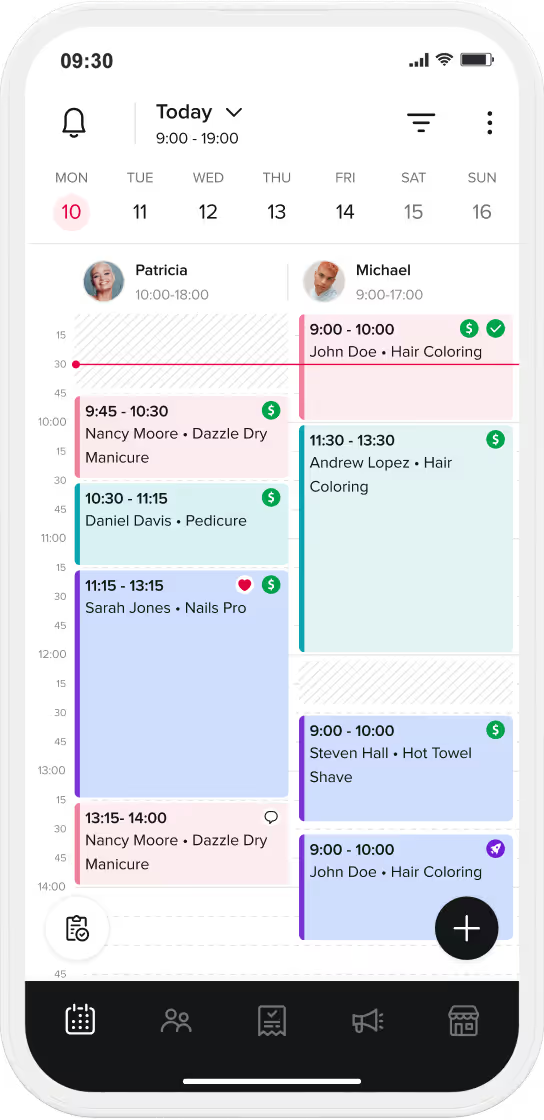

Booth renting has gained significant popularity in the salon industry—and for good reason. It offers beauty professionals the flexibility they need to manage their own schedules and grow their businesses while providing salon owners with an additional income stream. This arrangement can create a win-win situation for both parties.
However, for this model to work successfully, it’s important for salon owners and booth renters to clearly understand their respective roles and responsibilities. Establishing clear expectations ensures a smooth, professional working relationship that benefits everyone involved.
This guide covers salon owner responsibilities to booth renters, and booth renter responsibilities, and answers key questions such as, "Can a salon owner fire a booth renter?"
If you’re a salon owner and you’re considering a booth rental model or a booth renter stepping into the world of independent contracting, this article is your go-to resource for clarity and understanding.
Booth renting in the salon industry refers to an arrangement where licensed beauty professionals (booth renters) rent a designated space within a salon to offer their services. Unlike employees, booth renters are independent contractors who run their mini-business within the salon.
This setup is popular because it allows flexibility for both parties:

When salon owners rent out booths, they have specific responsibilities to ensure a professional and fair environment for their renters. While booth renters operate as independent contractors, salon owners must uphold their end of the agreement to foster a positive working relationship.
The salon owner must ensure the booth rental space is functional and meets the standards required by local laws and cosmetology boards. This includes:
A written agreement is crucial for both parties. The agreement should outline:
This document helps set expectations and protects both the salon owner and the booth renter legally.
Salon owners need to remember that booth renters are not employees. Salon owners cannot dictate how booth renters perform their services, what prices they charge, or how they schedule their clients. Overstepping these boundaries can lead to legal issues, including misclassification of contractors as employees.
Booth renters operate as independent contractors, meaning they are essentially running their businesses. This comes with freedom but also significant responsibilities. So, what responsibilities does a booth renter assume? Let’s break it down:
One of the primary responsibilities of a booth renter is to pay their rent as outlined in their agreement. Late payments or nonpayment can result in lease termination.
Booth renters are responsible for staying compliant with local laws and regulations, which typically include:
Unlike employees, booth renters are responsible for bringing their equipment, tools, and products. This includes everything from styling tools to skincare products and towels.
Booth renters operate independently, meaning they are responsible for:
Booth renters must keep their designated space clean and comply with salon rules about shared areas. Additionally, they are expected to act professionally to maintain a positive salon atmosphere.
Clear rules help salon owners and booth renters work together harmoniously. Here are some common salon booth rental rules that ensure fairness and professionalism:
A common question is, "Can a salon owner fire a booth renter?" The answer is no—but with an important caveat.
A salon owner cannot “fire” a booth renter like they would an employee because booth renters are independent contractors. However, the salon owner can terminate the booth rental agreement if the renter violates the terms of the contract. Common reasons for terminating a lease include:
Both parties must refer to the rental agreement in case of disputes or lease termination. This is why having a clear, written agreement is so important.
The relationship between salon owners and booth renters is built on mutual respect, clear communication, and well-defined roles. Salon owners must provide a safe and functional workspace while respecting the independence of their renters. Meanwhile, booth renters take on the responsibilities of running their own business, from managing clients to maintaining professionalism.
A clear rental agreement is the cornerstone of a successful arrangement, ensuring that both parties understand their rights and responsibilities. By following these guidelines and respecting salon booth rental rules, salon owners and booth renters can create a harmonious and successful working relationship.
Overstepping legal boundaries by trying to manage them like employees. Owners cannot set a renter's prices or dictate exactly how they perform a service. This is a violation of independent contractor laws.
Yes. Since booth renters are independent business owners, they must obtain their own professional liability insurance to protect themselves and their clients.
This depends entirely on the written booth rental agreement. Typically, a lease can be terminated for nonpayment of rent or violation of salon rules (like cleanliness standards), but the notice period must follow the contract terms.
The booth renter is responsible for providing all of their own tools, back-bar products, towels, and supplies. The salon owner only provides the physical infrastructure.
This should be defined in the rental agreement. While renters set their own schedules, they generally must respect the salon's operating hours unless the owner provides 24/7 access.

